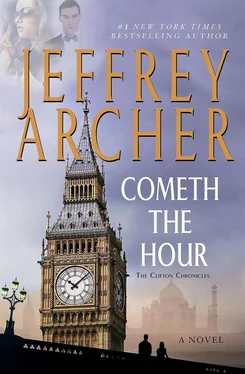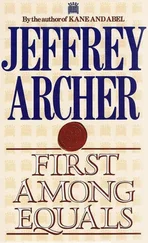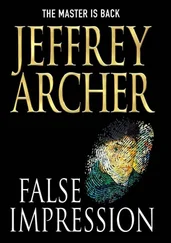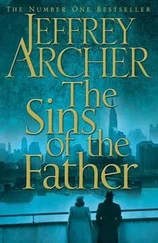“That’s very considerate of you, Adrian, but I don’t think I’ll risk it a second time. I’ll tell you the code, but only after you’ve transferred twenty-five thousand pounds to my account at Coutts.”
When the bank confirmed that the money had been transfered, Virginia kept her side of the bargain. After all, it was no more than Desmond Mellor had instructed.
How different it all was from the last time Harry had visited the Russian capital, when they didn’t want to let him in, and couldn’t wait to throw him out.
On this occasion, when he stepped off the plane he was met by the British Ambassador.
“Welcome home, Mrs. Babakova,” said Sir Curtis Keeble, as a chauffeur opened the back door of a Rolls-Royce to allow Yelena to get in. Before Harry could join her, the ambassador whispered, “Congratulations on your speech, Mr. Clifton. But be warned, they’ve only granted you a visa on condition there will be no heroics this time.”
Harry was well aware what Sir Curtis was referring to. “Then why are they allowing me to attend the funeral?” he asked.
“Because they consider it the lesser of two evils. If they don’t let you in, they’re afraid you’ll say Babakov was never released, but if they do, they can claim that he was never in jail, always a schoolteacher and is being buried at his local church.”
“Who do they expect to fool with such blatant propaganda?”
“They don’t care what the West thinks, they’re only interested in how it plays out in Russia, where they control the press.”
“How many people are expected to attend the funeral?” asked Emma.
“Only a few friends and relations will have the courage to turn up,” said Yelena. “I’d be surprised if it was more than half a dozen.”
“I think it may be a few more than that, Mrs. Babakova,” said the ambassador. “All the morning papers are carrying photographs of you receiving the Nobel Prize on your husband’s behalf.”
“I’m surprised they allowed that,” said Harry.
“It’s all part of a carefully orchestrated campaign known as ‘overnight history.’ Anatoly Babakov was never in jail, he lived peacefully in the suburbs of Moscow and the prize was for his poetry and brilliant novella Moscow Revisited. Not one paper mentions Uncle Joe, or refers to the speech you gave last night.”
“Then how do you know about it?” asked Harry.
“It’s all over the wires. There are even photos of you holding up your pen.”
Emma took Yelena’s hand. “Anatoly will defeat the bastards in the end,” she said.
It was Harry who saw them first. To begin with, small pockets of people huddled together on street corners, holding up pens, pencils, biros, as the car swept by. By the time they drew up outside the little church, the crowd had grown — several hundred, a thousand perhaps, all making their silent protest.
Yelena entered the packed church on Harry’s arm, and the three of them were shown to reserved places in the front row. The coffin was borne in on the shoulders of a brother, a cousin and two nephews, none of whom Yelena had seen in years. In fact one of her nephews, Boris, hadn’t even been born when Yelena had escaped to America.
Harry had never attended a Russian Orthodox funeral before. He translated the priest’s words for Emma, although his Russian was a little rusty. When the service came to an end, the congregation filed out of the church to reassemble around a freshly dug grave.
Harry and Emma stood on either side of Yelena as her husband was lowered into the ground. As his next of kin, she was the first to throw a handful of earth onto the coffin. She then knelt beside the open grave. Harry suspected that nothing would have moved her if the ambassador hadn’t bent down and whispered, “We must leave, Mrs. Babakova.”
Harry helped her back to her feet. “I won’t be going with you,” she said quietly.
Emma was about to protest, but Harry simply said, “Are you sure?”
“Oh yes,” she replied. “I left him once. I’ll never leave him again.”
“Where will you live?” asked Emma.
“With my brother and his wife. Now their children have left home, they have a spare room.”
“Are you absolutely certain?” asked the ambassador.
“Tell me, Sir Curtis,” said Yelena, looking up at the ambassador, “will you be buried in Russia? Or is there some village in your green and pleasant land...?” He didn’t reply.
Emma embraced Yelena. “We’ll never forget you.”
“Nor I you. And like me, Emma, you married a remarkable man.”
“We must leave,” said the ambassador a little more firmly.
Harry and Emma gave Yelena one last hug before they reluctantly left her. “I’ve never seen her happier,” said Harry as he joined Emma in the back of the ambassador’s Rolls-Royce.
Outside the churchyard, the crowd had grown, every one of them holding their pens high in the air. Harry was about to get back out of the car and join them when Emma put a hand on his arm.
“Be careful, my darling. Don’t do anything that will harm Yelena’s chances of living a peaceful life.”
Harry reluctantly removed his hand from the door handle, but defiantly waved to the crowd as the car sped away.
At the airport, the police were waiting for them. Not this time to arrest Harry and throw him into jail, but to escort him and Emma onto their plane as quickly as possible. Harry was just about to climb the aircraft steps when a distinguished-looking man stepped forward and touched him on the elbow. Harry turned around, but it was a few moments before he recognized the colonel.
“I’m not going to detain you this time,” said Colonel Marinkin. “But I wanted you to have this.” He handed Harry a small package and hurried away. Harry walked up the steps to the waiting aircraft and took his seat next to Emma, but didn’t open the package until the plane had taken off.
“What is it?” she asked.
“It’s the only surviving copy of Uncle Joe in Russian, the one Yelena hid in the bookshop.”
“How did you get it?”
“An old man gave it to me. He must have decided I ought to have it, even though he told the court it had been destroyed.”
“It is Saturday, isn’t it?” said Emma.
“Yes. Why do you ask?” said Harry, not looking up from his morning paper.
“A post office van’s just driven through the gates. But Jimmy doesn’t usually deliver on a Saturday morning.”
“Unless it’s a telegram?”
“I hate telegrams. I always assume the worst,” said Emma, as she jumped up from the table and hurried out of the room. She had opened the front door before Jimmy could ring the bell.
“Mornin’, Mrs. Clifton,” he said, touching his cap. “I’ve been instructed by head office to deliver this letter.”
He handed over a long thin cream envelope addressed to Harry Clifton Esq. The first thing Emma noticed was that it didn’t have a stamp, just a royal crest embossed in red above the words BUCKINGHAM PALACE.
“It must be an invitation to the Queen’s garden party.”
“December seems a strange time to be inviting someone to a garden party,” said Jimmy, who touched his cap again, returned to his van and drove off.
Emma closed the front door and quickly returned to the breakfast room. “It’s for you, darling,” she said, handing the envelope to Harry. “From Buck House,” she added nonchalantly, as she hovered behind him.
Harry put down his paper and studied the envelope, before picking up a knife and slowly slitting it open. He pulled out a letter and unfolded it. He read the contents slowly, then looked up.
“Well?”
He handed the letter to Emma, who had read no further than the opening words, I am commanded by Her Majesty, before she said, “Congratulations, my darling. I only wish your mother was still alive. She would have enjoyed accompanying you to the Palace.” Harry didn’t respond. “Well, say something.”
Читать дальше












